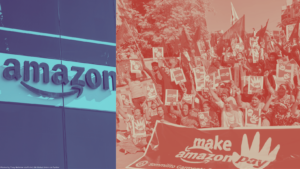Digital technologies are changing economies, governance, and ways of living. The digital transformation has accelerated in the pandemic context, with projections showing that platform companies would capture 30% of global economic activity by 2025.
At the 67th Session of the Commission on the Status of Women (CSW67) this March, conversations focused on concerns regarding the accessibility and inclusivity of digital technologies. However, it missed out on a crucial question: who is driving the directions of the digital transformation?
Digital corporate capture
The digital economy is based on the accumulation of data and the use of artificial intelligence to interpret data and make them profitable. Data refers to “discrete bits of information that are digitally recorded, machine processable, easily agglomerated, and highly mobile” about people’s lives – “their identities, beliefs, behaviours, and other personal information”. These include basic personal information provided by individuals to sign up for social media platforms, health information such as women’s menstruation cycles logged on period tracker apps, to app taxi drivers’ routes gathered by ridesharing companies, and warehouse workers’ work rate collected through body-worn tracking devices. Digital platforms such as social media (e.g. Facebook, Tiktok, Instagram, etc.) and e-commerce platforms (Amazon, Shopee, Alibaba) rely on data or, to put it frankly, exploit people’s personal information, to make business.
The US and China dominate the digital economy, owning the majority of the world’s digital infrastructure and capital, and capturing the profits generated by digital platforms. However, US tech goods and services remain the most popular, such as in search engines, web browsers, gadgets and devices, social media platforms, among others.
The biggest technology corporations collectively known as ‘Big Tech’ are based in the US: Apple, Amazon, Microsoft, Alphabet/Google, and Facebook/Meta. Big Tech grew tremendously in the past decade, especially during the pandemic. The boom appeared to hit its end by 2022, as big tech corporations cumulatively suffered losses in market value in the trillions. Hundreds of thousands of workers in the industry have been laid off in the first quarter of 2023, as US-based tech corporations, including Alphabet, Meta, and Amazon, try to cover losses. Despite business downturns, Big Tech has maintained its monopoly over digital infrastructure, technologies, online platforms, and data. It is at the helm of digital transformation.
Old oppressions, and then some
Big tech corporations profit by exploiting the resources and labour of peoples in the global South.
In the global South, informal workers, largely women, provide cheap labour in increasingly precarious conditions for big tech corporations. They pack deliveries for e-commerce platforms, provide customer support, wipe out harmful content from social media, do the menial work that drives AI systems, carry out care work as domestic workers recruited through platform companies, among others. The digital economy has exacerbated the informalisation of labour, and threatens to displace over two-thirds of the workforce in the global South.
Peasant, indigenous, and rural women are driven away from their lands to give way to mining operations that extract the raw minerals that are needed by the tech industry. This is the case in the cobalt mines in the Democratic Republic of Congo, and lithium-rich lands of the indigenous Atacamas people in Chile, Argentina, and Bolivia.
Data are a new form of resource that corporations extract and exploit. Anyone who uses gadgets and devices produced and online platforms owned by big tech corporations provide their personal data to these corporations without being fully informed about their decision, nor compensation. Big tech corporations extract and exploit the data of their users for profit, and use their accumulated data to further develop profit-driven technologies. In the present context, the majority of developing countries do not have the means to make use of their own data, and have become merely data mines for big tech corporations.
Big Tech’s path to domination has been paved by neoliberal policies that liberalised the global South for foreign investments, deregulated labour markets at the expense of workers’ rights and welfare, and privatised public assets and services for corporate capture. The neoliberal promises of technology transfers, industrialisation, and development have all been proven false after decades of destruction.
Political and cultural influence comes with Big Tech’s economic power. Social media now plays a major role in facilitating and shaping social interactions, public opinion, and, recent elections have shown, even the fate of democracies. The collaboration of states and big tech corporations on developing surveillance technologies and systems threaten women activists and human rights defenders, and, generally, everyone’s right to privacy.
The lack of oversight over Big Tech’s social media platforms allows the perpetuation of rampant misogyny in online spaces exemplified in viral content that degrade women and girls, and unregulated sexist behaviour of users online. Studies show the sexist and racist tendencies of digital technologies as women remain relegated at the back end of digitalisation and are systematically excluded from participating in their development.
A digital future for all
The digital corporate capture facilitates a profit-driven digitalisation based on extractivism and exploitation. As we continue to reckon with the realities of digitalisation, it is important to show how it is related to systemic problems that tend to exacerbate barriers to the realisation of women’s rights and gender justice, especially in the global South. Global policy spaces will continue to take up the issue, such as at the United Nations Summit of the Future in 2024 where a Global Digital Compact outlining “shared principles for an open, free and secure digital future” will be negotiated.
Digitalisation is interlinked with, and should be tackled alongside fundamental, development issues concerning women in the global South such as the right to land, living wages, access to social services, participation in policy- and decision-making, and the right to development. Ensuring a digital future for all would mean upholding the economic, cultural, social, and civil-political rights of women and other marginalised groups. This would entail tackling Big Tech’s power, and coming up with relevant policies that take into account the development priorities of Southern economies. #
References:
Digital McKinsey Insights 2018
World Development Report 2016: Digital Dividends
Kwet, Michael. 2018. Digital Colonialism: US Empire and the New Imperialism in the Global South.
Sadowski, Jathan. 2019. When data is capital: Datafication, accumulation, and extraction.




